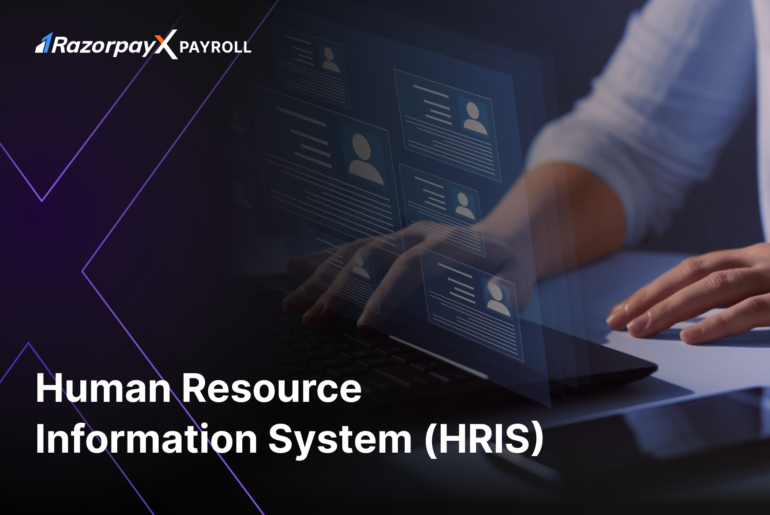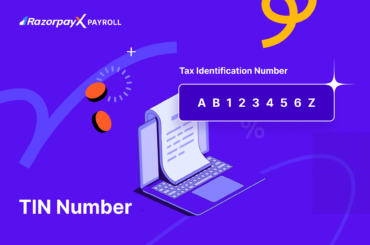A Human Resource Information System (HRIS) is a software solution designed to automate and manage various HR tasks and processes.
A powerful HRIS is a must-have for all businesses, especially high-growth and tech-enabled businesses. HRIS helps automate all HR functions, from payroll to recruitment.
Table of Contents
What is HRIS?
A Human Resources Information System (HRIS) is a centralized database that stores, organizes and processes employee data.
It is designed to manage and automate different aspects of a company’s HR department. A good HRIS helps HR professionals work more efficiently, strategically, and make informed decisions about the workforce.
HRIS vs HRMS vs HCM
A HRIS, HRMS and HCM are all software used by the Human Resources Department.
The main focus of an HRIS is data management and record keeping. It includes features like an employee self-service portal, analytical capabilities and more.
A Human Resources Management System (HRMS) expands on the capabilities of a HRIS, including more functions like recruitment and talent management.
A Human Capital Management (HCM) software is the most robust solution for HR departments. It provides a holistic approach to managing and optimizing the workforce, integrating HRIS and HRMS features with additional modules like L&D, compensation and workforce planning.
Powerful Payroll & HR Automation
Key Features and Functions of HRIS
Information Management
HRIS acts as a comprehensive repository for all employee data, ranging from basic personal details to attendance and tax declarations. This centralized database ensures quick and efficient access to information when needed.
Payroll and Benefits Administration
It facilitates accurate and timely payroll processing, automating tax calculations, deductions, and other financial aspects. Additionally, it streamlines benefits administration, enabling employees to manage their benefits efficiently.
Time and Attendance Tracking
The system helps track employee attendance, work hours, and leave records. This data can be used to calculate pay, monitor absenteeism, and improve workforce scheduling.
Recruitment and Onboarding
HRIS streamlines the recruitment process by posting job openings, managing applications, and tracking candidates throughout the recruitment pipeline. It also aids in the onboarding process, ensuring a smooth transition for new hires.
Performance Management
The system enables HR professionals to set performance goals, conduct evaluations, and provide feedback to employees. This fosters a culture of continuous improvement and employee development.
Training and Development
HRIS assists in identifying skill gaps and training needs within the organization. It offers training modules and tracks employee progress to enhance workforce capabilities.
Types of HRIS Systems
There are five main types of Human Resource Information Systems.
- Operational HRIS: This type of HRIS focuses on automating and streamlining day-to-day HR tasks, such as payroll, timekeeping, and benefits administration.For HR teams that spend a lot of time on tedious, repetitive tasks like recording or searching for data, an operational HRIS is a good way to streamline the HR function.A good example of an operational HRIS is Zoho People, which offers features like payroll, timekeeping, benefits administration and more.
- Tactical HRIS: A tactical HRIS is used in resource allocation and analysing trends. It deals less with day to day tasks like record keeping, and more with helping make macro-level decisions about resources and budgeting.An example of tactical HRIS is PeopleStrong, which offers workforce analytics, reporting and benchmarking.
- Strategic HRIS: Strategic HRIS helps with goal-setting and future workforce planning. This is an important system for businesses looking to grow, since it helps with strategic, data-driven workforce decisions.SAP SuccessFactors is a strategic HRIS that helps with talent analytics, scenario planning and more.
- Comprehensive HRIS: A comprehensive HRIS combines all the above functions into one streamlined solution. It helps HR teams with tasks both on a day to day and a macro level.These software can be slightly more expensive since they offer a wider range of features and functionality. Workday HCM is one such solution.
- Limited-function HRIS: These solutions cater to certain specific needs of the HR department. They are popular with small or medium size enterprises. One example is RazorpayX Payroll, which primarily helps with the payroll functionality.However, RazorpayX Payroll offers integrations with dozens of tools like Zoho People, Darwinbox, Slack, WhatsApp and more – making it more of a comprehensive solution.
Functions of HRIS
The main function of an HRIS is to automate HR tasks and streamline workforce management workflows. Without an HRIS, all HR tasks will have to be done manually, resulting in errors, delays and a massive waste of resources.
HRIS tools are built to make the following tasks easier:
- Data management
- Recruitment and applicant tracking
- Performance appraisals
- Compensation management
- Reporting and data analytics
- Employee self-service
- Leave management
- Approval workflows
- Payroll processing
- Employee engagement
Benefits of HRIS Implementation
- Enhanced Efficiency: It automates repetitive tasks, freeing up HR professionals’ time to focus on strategic initiatives, and improving productivity across the organization.
- Improved Data Accuracy: The centralized nature of HRIS reduces data redundancy and minimizes the chances of errors, ensuring reliable and up-to-date information.
- Data Security: It provides robust security measures to protect sensitive employee data, guarding against unauthorized access and data breaches.
- Compliance and Reporting: The system simplifies compliance with labour laws and regulations by generating accurate reports and ensuring adherence to legal requirements.
- Strategic Decision-Making: Access to real-time analytics and insights empowers HR leaders to make data-driven decisions, leading to better organizational outcomes.
- Employee Self-Service: HRIS allows employees to access and manage their own information, from updating personal details to viewing payslips, fostering transparency and accountability.
The benefits of HRIS implementation, such as improved efficiency, data accuracy, and strategic decision-making, are evident across businesses of all sizes. As technology continues to advance, HRIS will undoubtedly evolve, empowering organizations to create a more engaged and productive workforce.
Challenges of Human Resources Systems
While Human Resources Information Systems (HRIS) offer undeniable benefits, navigating their implementation and ongoing use presents real challenges for organizations. One key hurdle lies in integration: seamlessly connecting the HRIS with existing software ecosystems, payroll platforms, and talent management tools. Incompatibility can lead to data silos, hindering comprehensive insights and workflow efficiency.
Furthermore, ensuring data accuracy and security is critical. Inaccurate employee information can lead to payroll errors, compliance issues, and employee frustration. Protecting sensitive data from breaches requires robust security measures and ongoing employee training on data privacy best practices.
Finally, user adoption plays a crucial role. If employees find the HRIS clunky or unintuitive, they’ll be less likely to utilize its full potential, limiting its effectiveness. Comprehensive training and ongoing support are essential to ensure user buy-in and optimize the system’s impact.
Addressing these challenges necessitates a collaborative approach from leadership, IT, and HR teams. By prioritizing strategic planning, robust data governance, and user-centric design, organizations can unlock the true potential of their HRIS, fostering a streamlined, data-driven, and employee-centric HR environment.
HRIS & Payroll Software for Indian Companies of All Sizes
There are numerous HRIS providers in the market, each offering unique features and customization options. But if you truly want comprehensive software, check out RazorpayX Payroll.
- Direct salary calculations & transfers to employees, interns and contractors
- Automate filing AND payment of compliances like PT, PF, TDS and ESIC; with challans available for your perusal on the dashboard
- Get support from a dedicated agent in under 30 minutes on live-chat
- Investment proof declarations and proof submissions on the dashboard
- Simplified HR Management from onboarding to exit, powered by Zoho People
- Exclusive employee insurance plans from Plum at 70% lower costs
Not only that, we’ve built extremely employee-friendly features like:
- Instant reimbursement claims and payslip generation on WhatsApp
- Investment proof submission (which we check for you)
and more!
5000+ companies like Treebo, Lendingkart, and Art of Living have already embraced our 3-click payroll solution.
FAQs
What is the difference between HRIS and HRMS?
HRIS and HRMS (Human Resource Management System) are often used interchangeably, but there is a subtle difference. While HRIS mainly focuses on storing and managing employee data, HRMS typically includes additional modules such as payroll, talent management, and performance appraisal.
Is HRIS suitable for small businesses?
Absolutely! HRIS is beneficial for businesses of all sizes. For small businesses, it can significantly reduce administrative burdens and ensure HR tasks are handled efficiently.
How does HRIS ensure data security and confidentiality?
HRIS providers implement robust security measures, including data encryption, access controls, and regular system audits to safeguard sensitive employee information.
Can HRIS be integrated with other business systems?
Yes, most modern HRIS solutions offer integration capabilities with other business systems like accounting, ERP, and applicant tracking systems, providing a seamless data flow across various departments. RazorpayX Payroll connects with 15+ HR Tech giants, including Zoho People, Zaggle, Plum, SpringVerify, WhatsApp, Cams, Cleartax, Freshteam and Slack.
What is HRIS software?
HRIS software, also known as Human Resource Information System, is a digital solution for managing all your employee data. It streamlines tasks like payroll, benefits administration, and timekeeping. Essentially, HRIS acts as a central hub for employee information, making HR processes more efficient and allowing HR professionals to focus on strategic initiatives.
What are the Benefits of Moving a HRIS to the Cloud?
Moving HRIS to the cloud unlocks several advantages. It offers greater accessibility for HR and employees to access data anytime, anywhere. Cloud-based HRIS also eliminates the need for expensive hardware and software maintenance, leading to cost savings. Furthermore, automatic updates ensure your system stays compliant with ever-changing regulations, giving you peace of mind.
What are the different HRIS Models?
HRIS systems come in various functionalities. Limited-function tackles one area like payroll, while operational handles core HR tasks. Tactical HRIS offers recruitment and training features, and strategic HRIS goes beyond with data analytics for better decision-making. Finally, comprehensive HRIS combines all the functionalities for a complete HR management solution.
What are the things to consider before choosing the HRIS?
Before diving into HRIS options, consider your company's needs. Think about the size of your workforce, what HR tasks you want to automate, and your budget. Look for features that address your current pain points and offer room for future growth. Finally, ensure the system is user-friendly for both HR professionals and employees.





